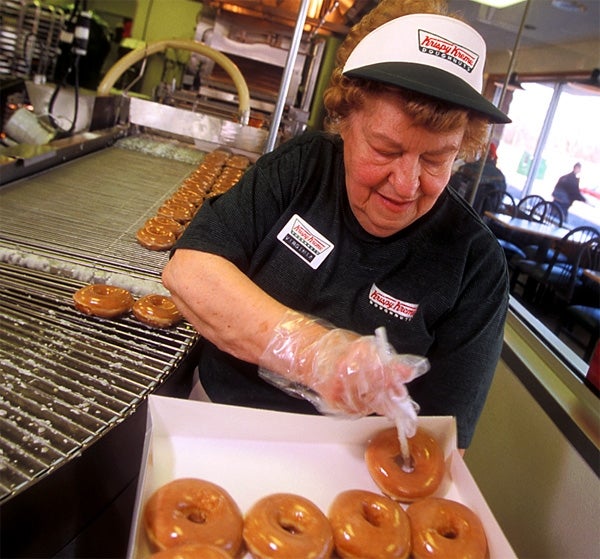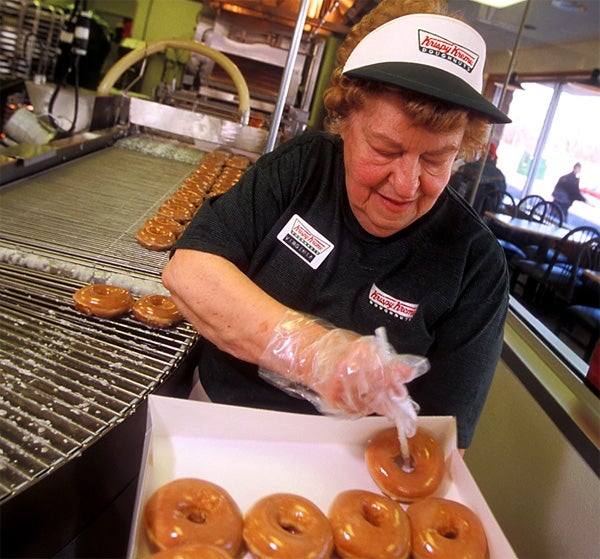CHANDLER, AZ—Old age used to be considered a period of decreased activity, mental slowdown, and reduced usefulness to society. In recent years, however, a new generation of ambitious, resourceful senior citizens is turning that trend on its head, reclaiming their youthful vigor by taking on second jobs.

“For too long, society has told seniors that they are worn out, washed up—that they’ve paid their dues and now it’s time to rest,” said Arizona State economics professor Victor Romansky, a leading expert on the elderly workforce. “Well, the 65-and-over crowd isn’t taking ’no’ for an answer any longer.”
Romansky added: “The face of the American senior citizen is changing. Instead of a glum widow coming home from her gift-shop job to sit in a rocking chair all night, we’re seeing the eager smile of a Walgreens cashier working the 6-10 p.m. shift.”
Supplementary employment, once reserved for the young and middle-aged, is quickly being discovered by the “middle-aged at heart,” Romansky said.
“Whoever said people should settle into just one job at 65 never witnessed the pride of an 80-year-old grocery bagger,” said Skip Eldrud, CEO of the job-placement company Vital Signs Temporary Labor. “It’s moving to see that the can-do American spirit lives on, well into the years when declining bodily functions make many tasks difficult or even painful to complete.”
“Wake up, service and office-support industries!” Eldrud added. “America’s seniors are knocking on your door, and they’re politely requesting an employment application.”
According to Romansky, the increased drive for subsistence is ensuring the pre-Baby Boomer demographic a place in the U.S. workplace.
“A recent study showed that a modern American worker will hold an average of 14 jobs in his lifetime,” Romansky said. “Seniors, many of whom have been working in the same field for their entire lives, are now trying to catch up. With the plucky, eager-to-please demeanors they bring to high-turnover professions, I wouldn’t be surprised if many ’retired’ folks worked another 20 jobs before they die.”
Romansky said an additional job gives structure and meaning to the hours before and after work—hours that seniors once spent worrying about rent and insurance premiums.
Eleanor Reynolds, 71, recently took a job as a gas-station attendant to supplement her income as an administrative assistant.
“I thought I’d be spending my retirement looking through old photo albums and watching TV,” said Reynolds, 71. “Boy was I wrong! I barely have a minute to spare. Instead of sitting around the house and reading, I’m earning $6.25 an hour.”
Reynolds was a role model for many of the women in her now-disbanded knitting society, all of whom stopped talking about needing pills and decided to do something about it. Three of these geriatric go-getters now spend their evenings telemarketing.
“I used to sit around at night waiting for the phone to ring,” said senior Margie Bell, 68, of Litchfield Park, AZ. “Now, if I’m even five minutes late for work, I know I’ll get a call from my Capital One supervisor.”
Romansky said that some septuagenarians need a little encouragement to recognize their latent industriousness.
Clarence Lattimer, 72, of Apache Junction, AZ considered grabbing life by the horns after his military pension was reduced from $847 to $735 per month in November. But it wasn’t until his daughter-in-law kicked him out of her house in January that Lattimer actually put his plan into action, enrolling in a night-school security-guard training program at the local technical college.
“It’s such a relief to see Clarence out there on his own, supporting himself,” his daughter-in-law Denise said. “There’s no time like the present, while his cancer is in remission.”
A second job brought Allentown, PA’s Ginny Edsel not just a meager second paycheck, but somewhere to go on weekends.
“I hadn’t bought a new outfit in almost six years,” said Edsel, 71, who recently took a supplementary job at Burger King. “But now, I’ve got a brand new set of clothes. And a hat!”
In her book Back From The Pasture, sociologist Anne Bailey said there is a reason why the second-job trend has spread so quickly among America’s seniors.
“The re-energizing of an entire generation didn’t just happen,” Bailey said. “Seniors began to take their futures into their own hands after the notion that society must coddle those in the twilight of life became outdated. These days, it’s not just acceptable for seventysomethings to work multiple jobs outside the home, it’s encouraged. And with everyone questioning the viability of Social Security, it looks like this fearless do-it-yourself attitude is here to stay.”







